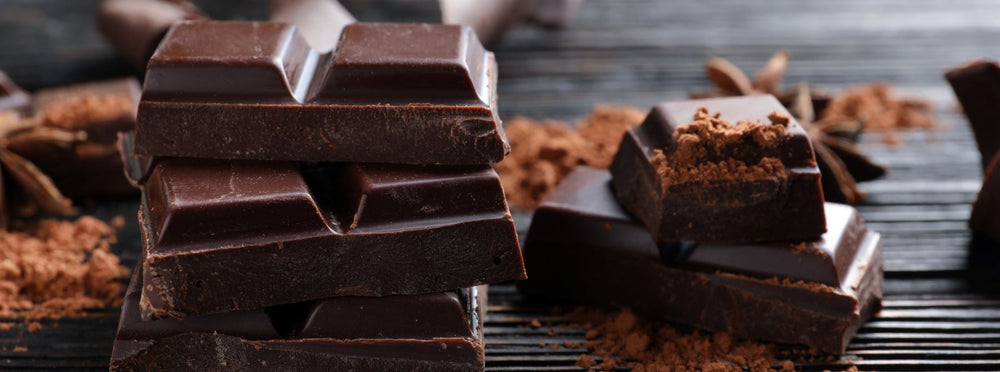Your top 5 chocolate questions answered

We regularly receive questions about the chocolate we use in our products. After all, it figures prominently in 3 of our bars. I thought I’d take time today to answer the most common queries we receive.
Q: Chocolate seems like a treat not a health food. Why does Step One Foods include chocolate in its products?
A: Dark chocolate is a good source of zinc, magnesium and iron – minerals that are often missing in people’s diets. It’s also a great source of antioxidants which fight free radicals, help lower blood pressure and reduce inflammation. Studies have also shown eating dark chocolate can improve insulin sensitivity, gut microbiome diversity and even improve brain neuroplasticity. I’m not about to label dark chocolate a miracle food, but in reasonable quantities it certainly has the potential to support cardiovascular health and healthy longevity – all while tasting AH-MAZING.
Q: Why do you only use 72% cacao chocolate?
A: Flavonoids are powerful antioxidants that are present in various foods like tea, berries, parsley - and chocolate. The health benefits of chocolate are highest when flavonoid content is high – and flavonoid levels are driven by cacao content. The higher the cacao content, the higher the flavonoid content. Generally, chocolate that’s 70% or higher in cacao content delivers lots of flavonoids.
Q: Why should I avoid combining milk with dark chocolate?
A: The amount of flavonoids present in ingested food has little impact unless those flavonoids are absorbed. Proteins in dairy milk have been shown to reduce the absorption of flavonoids so the combination is not a good one. Milk chocolate – where milk and chocolate come together as a package from the get-go - is less health promoting for this very reason (besides also being higher in sugar). As an aside, health benefits associated with tea and coffee come from their antioxidant content as well, so I would avoid adding milk to those beverages.
Note that these comments are specific to dairy milk. I am not aware of research around plant-based “milks” and flavonoid availability. I suspect the effect would be much less pronounced.
Q: What is lecithin and why is it in chocolate?
A: Oil and vinegar will naturally separate when you’re making a salad dressing unless you add something like mustard when blending them together. Mustard acts as an emulsifier, meaning it helps keep tiny particles of oil fat suspended uniformly throughout the vinegar. Lecithin serves as an emulsifier for chocolate. It helps keep tiny particles of cocoa butter suspended throughout the chocolate mixture. Unlike the amounts of mustard needed to emulsify oil in vinegar, you just need tiny amounts of lecithin to ensure cocoa butter emulsification (typically 0.1% by weight). The vast majority of consumable chocolate contains a lecithin emulsifier, usually derived from soy and sometimes sunflower extracts.
Q: Chocolate contains saturated fat. Won't that raise my cholesterol?
A: Fat in chocolate is very different than fat in meat. In chocolate, approximately one third of the fat comes from stearic acid, one third comes from oleic acid and one third comes from palmitic acid. Stearic acid is a saturated fat, but it does not raise LDL cholesterol because it doesn’t stay a saturated fat for long. Instead, it’s immediately converted in the liver to oleic acid, a monounsaturated fat.
Oleic acid, which itself comprises one-third of chocolate's total fat, is a heart healthy omega-9 fatty acid that can lower cholesterol and reduce inflammation.
Palmitic acid is a saturated fat and can raise cholesterol, but relatively speaking there’s far less palmitic acid in chocolate than in red meat or cheese. Studies where effects of dark chocolate on cholesterol have been examined, if anything, demonstrate modest decreases in LDL cholesterol levels.

Tested & Proven Results.
- Cardiologist formulated
- Supported by over 500 publications
- Clinically-proven, in a double-blind randomized trial with Mayo Clinic and The University of Manitoba
80% of participants lowered their cholesterol in just 30 days. With just two servings per day, Step One Foods offers a proven-effective way to naturally lower LDL (bad) cholesterol.
Get heart health tips and articles like this, delivered right to your email.
New articles every week.
You may also like...

Spring Into Heart Health: The Best Seasonal Foods to Eat Now

You don’t need to avoid foods with cholesterol…except for these



